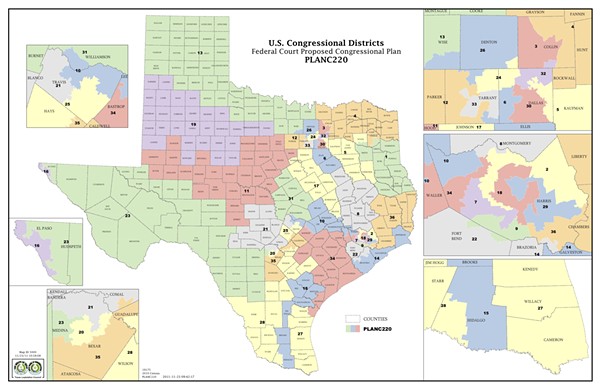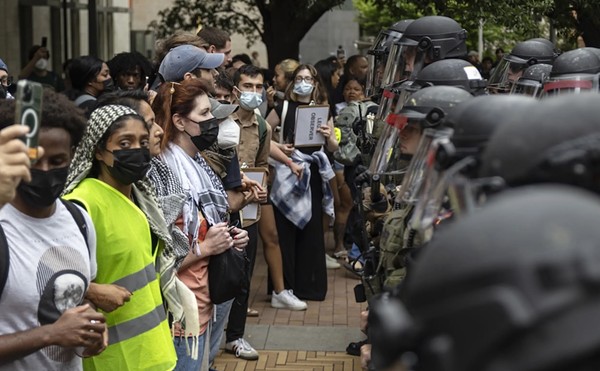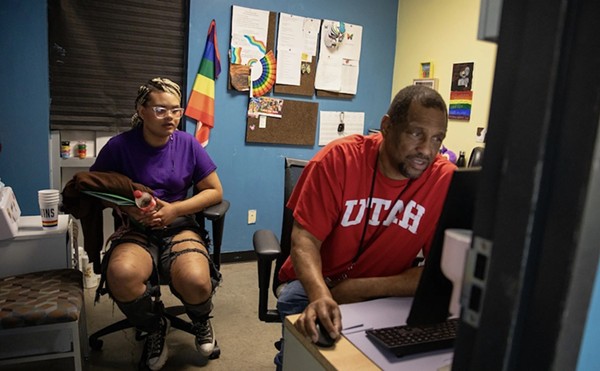The Supreme Court Just Gutted Texas' Defense of Its Racially Gerrymandered Congressional Districts
By Michael Barajas on Tue, May 23, 2017 at 1:04 pm
A U.S. Supreme Court ruling in a North Carolina gerrymandering case likely just torched Texas officials' main defense in a similar challenge over the state's congressional lines.
The 5-3 ruling strikes down two of North Carolina's congressional districts, which the state's Republican lawmakers had argued were drawn because of partisan politics, not race (it just so happens that black voters in the state overwhelmingly vote Democrat). The ruling may have set a new precedent by largely gutting that common excuse — that, so long as lines were drawn based on politics, and therefore unintentionally racist, there's nothing wrong. As Justice Elena Kagan wrote in the majority opinion, "the sorting of voters on the grounds of their race remains suspect even if race is meant to function as a proxy for other (including political) characteristics."
Rick Hasen, a widely-cited elections law expert at the University of California, Irvine, wrote on his blog following the opinion: "Holy cow this is a big deal. ...This will lead to many more successful racial gerrymandering cases in the American South and elsewhere."
The ruling appears to upend Texas' key argument as it heads back to court over the state's congressional maps. In March, a three-judge panel in San Antonio ruled that the maps the GOP-dominated Texas Legislature drew in 2011 were gerrymandered to dilute the minority vote. A court hearing to determine how those lines should be drawn ahead of the 2018 election is currently scheduled for July. (A ruling in a separate case the following month concluded lawmakers also deliberately gerrymandered the Texas House maps to curb the state's growing minority voter base). When he was attorney general, Gov. Greg Abbott argued that the plaintiffs should have to prove "that the Texas Legislature’s redistricting decisions were motivated by unconstitutional racial animus rather than a desire to maximize the Republican Party’s electoral prospects." In situations where race and party politics are intertwined, that might no longer be the case, per Monday's court ruling.
That's why, hours after the SCOTUS opinion dropped, a federal judge in Texas' upcoming redistricting hearing ordered state lawyers and plaintiffs in the case to submit briefs outlining how the new precedent will affect their case.
The judge, San Antonio's Xavier Rodriguez, also suggested the parties discuss with Abbott's office whether they should just "voluntarily undertake redistricting" in a special legislative session, which only the governor could call.
Their deadline for briefs is June 6.
The 5-3 ruling strikes down two of North Carolina's congressional districts, which the state's Republican lawmakers had argued were drawn because of partisan politics, not race (it just so happens that black voters in the state overwhelmingly vote Democrat). The ruling may have set a new precedent by largely gutting that common excuse — that, so long as lines were drawn based on politics, and therefore unintentionally racist, there's nothing wrong. As Justice Elena Kagan wrote in the majority opinion, "the sorting of voters on the grounds of their race remains suspect even if race is meant to function as a proxy for other (including political) characteristics."
Rick Hasen, a widely-cited elections law expert at the University of California, Irvine, wrote on his blog following the opinion: "Holy cow this is a big deal. ...This will lead to many more successful racial gerrymandering cases in the American South and elsewhere."
The ruling appears to upend Texas' key argument as it heads back to court over the state's congressional maps. In March, a three-judge panel in San Antonio ruled that the maps the GOP-dominated Texas Legislature drew in 2011 were gerrymandered to dilute the minority vote. A court hearing to determine how those lines should be drawn ahead of the 2018 election is currently scheduled for July. (A ruling in a separate case the following month concluded lawmakers also deliberately gerrymandered the Texas House maps to curb the state's growing minority voter base). When he was attorney general, Gov. Greg Abbott argued that the plaintiffs should have to prove "that the Texas Legislature’s redistricting decisions were motivated by unconstitutional racial animus rather than a desire to maximize the Republican Party’s electoral prospects." In situations where race and party politics are intertwined, that might no longer be the case, per Monday's court ruling.
That's why, hours after the SCOTUS opinion dropped, a federal judge in Texas' upcoming redistricting hearing ordered state lawyers and plaintiffs in the case to submit briefs outlining how the new precedent will affect their case.
The judge, San Antonio's Xavier Rodriguez, also suggested the parties discuss with Abbott's office whether they should just "voluntarily undertake redistricting" in a special legislative session, which only the governor could call.
Their deadline for briefs is June 6.

KEEP SA CURRENT!
Since 1986, the SA Current has served as the free, independent voice of San Antonio, and we want to keep it that way.
Becoming an SA Current Supporter for as little as $5 a month allows us to continue offering readers access to our coverage of local news, food, nightlife, events, and culture with no paywalls.
Scroll to read more San Antonio News articles
Newsletters
Join SA Current Newsletters
Subscribe now to get the latest news delivered right to your inbox.


















